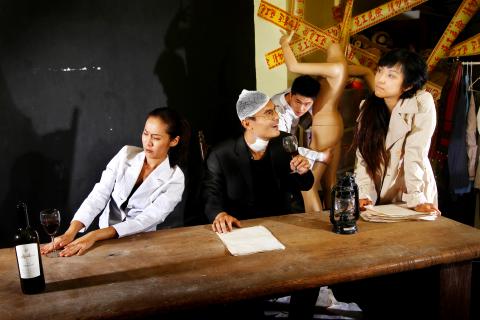Who-Ga-Sha-Ga (嬉戲: Who-Ga-Sha-Ga), Creative Society’s (創作社劇團) envelope-pushing 2004 satire that became the first emerging theater piece to win a Taishin Arts Award (台新藝術獎) for performing arts, is being revived.
It will play at the Huashan Living Arts Festival (華山藝術生活節) in a series of performances between Oct. 1 and Oct. 16 at Huashan 1914 Creative Park (華山1914).
Who-Ga-Sha-Ga has its origins in writer Chi Wei-jan’s (紀蔚然) monthly commentary columns for the literary magazine Ink (印刻文學生活誌) that were later adapted for the stage.

Photo courtesy of Creative Society
“This play was written in the year when the Taiwan Thunderbolt Fire (台灣霹靂火) TV series and Ang Lee’s Crouching Tiger, Hidden Dragon (臥虎藏龍) were all the rage,” producer Lee Huei-na (李慧娜) said at a rehearsal on Friday last week. “You’ll find social commentary and reflections underneath the comedy.”
The play was written by Chi, who is best known for the The Mahjong Game trilogy (夜夜夜麻三部曲), and is being directed by Fu Hung-cheng (符宏征), of The Impossible Times (渭水春風) fame. It stars theater veteran Winnie Chang (張詩盈), who won the best supporting actress award at the Taipei Film Festival for her role in Seven Days in Heaven (父後七日), and Alex Kuo (郭耀仁) as the leads. Wang Hong-yuan (王宏元) and Aboriginal actress Maital Dakiludun (買黛兒.丹希羅倫) have supporting roles.
Written shortly after the 319 shooting incident, an alleged assassination attempt against former president Chen Shui-bian (陳水扁) and former vice president Annette Lu (呂秀蓮) in Tainan on March 19, 2004, one day before the presidential election, Who-Ga-Sha-Ga is a sci-fi political satire that imagines Taipei plunging into anarchy after the event.
In the play, the Taipei City Government is forced into exile in Kaohsiung and Keelung and Yilan declare independence.
“With this revival, I decided to make minimal changes and kept the script mostly the same,” director Fu said. “Audiences will be surprised to find that the story still resonates and many of the social phenomena depicted here persist in today’s society.”
The plot unfolds in a post-apocalypse Taiwan, with a lowbrow theater troupe auditioning for a performance. Kuo and Chang act out satirical scenes based on Crouching Tiger and Taiwan Thunderbolt Fire, while Wang and Dakiludun portray the two leads’ alter egos. Audience members at the rehearsal laughed out loud at the jibes at oppressed sexuality and overblown hammy acting.

In the March 9 edition of the Taipei Times a piece by Ninon Godefroy ran with the headine “The quiet, gentle rhythm of Taiwan.” It started with the line “Taiwan is a small, humble place. There is no Eiffel Tower, no pyramids — no singular attraction that draws the world’s attention.” I laughed out loud at that. This was out of no disrespect for the author or the piece, which made some interesting analogies and good points about how both Din Tai Fung’s and Taiwan Semiconductor Manufacturing Co’s (TSMC, 台積電) meticulous attention to detail and quality are not quite up to

April 21 to April 27 Hsieh Er’s (謝娥) political fortunes were rising fast after she got out of jail and joined the Chinese Nationalist Party (KMT) in December 1945. Not only did she hold key positions in various committees, she was elected the only woman on the Taipei City Council and headed to Nanjing in 1946 as the sole Taiwanese female representative to the National Constituent Assembly. With the support of first lady Soong May-ling (宋美齡), she started the Taipei Women’s Association and Taiwan Provincial Women’s Association, where she

Chinese Nationalist Party (KMT) Chairman Eric Chu (朱立倫) hatched a bold plan to charge forward and seize the initiative when he held a protest in front of the Taipei City Prosecutors’ Office. Though risky, because illegal, its success would help tackle at least six problems facing both himself and the KMT. What he did not see coming was Taipei Mayor Chiang Wan-an (將萬安) tripping him up out of the gate. In spite of Chu being the most consequential and successful KMT chairman since the early 2010s — arguably saving the party from financial ruin and restoring its electoral viability —

It is one of the more remarkable facts of Taiwan history that it was never occupied or claimed by any of the numerous kingdoms of southern China — Han or otherwise — that lay just across the water from it. None of their brilliant ministers ever discovered that Taiwan was a “core interest” of the state whose annexation was “inevitable.” As Paul Kua notes in an excellent monograph laying out how the Portuguese gave Taiwan the name “Formosa,” the first Europeans to express an interest in occupying Taiwan were the Spanish. Tonio Andrade in his seminal work, How Taiwan Became Chinese,